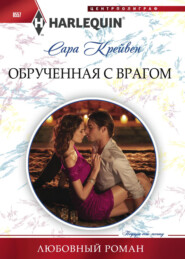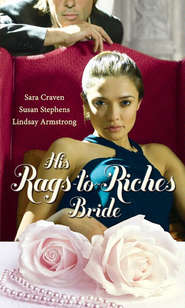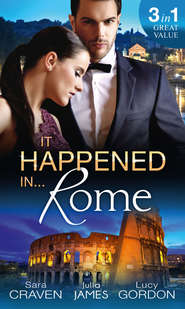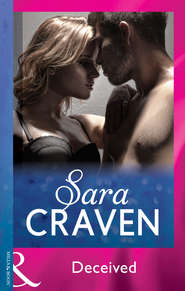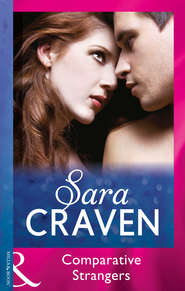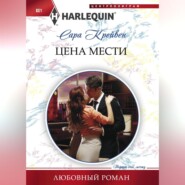По всем вопросам обращайтесь на: info@litportal.ru
(©) 2003-2024.
✖
The Marriage Truce
Автор
Год написания книги
2018
Настройки чтения
Размер шрифта
Высота строк
Поля
She’d been just thirteen when Thirza had been widowed and returned to take up residence in the village. And it was only a few months later when her stepson Ross had paid her a first visit.
He’d been twenty-one then, and had already embarked on his high-flying and successful career as a photojournalist.
A tall, self-contained young man, black-haired and tanned, with eyes as dark as a moonless night. And as impenetrable.
Nor was he conventionally handsome. His straight nose was a fraction too long and his eyes too heavy-lidded for that. But the high cheekbones and the firm, sensuous mouth were exquisitely chiselled, and when he smiled Jenna, for one, felt her heart turn over.
‘The looks of a fallen angel,’ Aunt Grace had commented privately, her lips pursed. ‘And trouble down to his handmade shoes.’
But Jenna and Christy hadn’t considered him troublesome at all. From the first moment they’d been open-mouthed at the sight of him, bowled over by the aura of easy confidence and sophistication that clung to him. Starryeyed at this answer to all their burgeoning adolescent dreams, who was even—oh, joy—some kind of distant cousin by marriage. Unable to believe that for all this time they had been barely aware of his existence. But Thirza herself had been hardly more than a name to them either.
They’d been more than ready for breathless, unequivocal hero-worship—had Ross Grantham shown any sign of wanting their adoration.
But he hadn’t. He greeted them with a cool civility bordering on indifference, and then appeared oblivious to their existence for the remainder of his stay.
Even after all this time, and in spite of everything that had happened since, Jenna could still wince at the memory of the lengths they’d gone to in their unavailing attempts to attract his attention.
Christy, who been reading Jane Austen’s Emma, had bewailed the fact that all her shoes were slip-ons, and she couldn’t stage an encounter by breaking a lace outside Thirza’s cottage.
Jenna had had notions of persuading one of the amiable hacks they rode at the local stables to bolt with her when Ross was passing, so that he would be obliged to save her.
But before she’d been able to put this daring plan into action Ross had gone. He’d called briefly at Trevarne House to say goodbye, but the girls had been taken shopping in Truro by Mrs Penloe, so they’d missed him. And he had left no message for them either.
‘Beast,’ Christy had said hotly, her pretty face pink with indignation. ‘Well, good riddance to him.’
Jenna had said nothing, aware only of a curious mixture of emotion churning in the pit of her stomach. Her almost agonised disappointment at his sudden departure had warred with an odd relief that such an unsettling presence had been removed, and her life could resume its usual placid path.
Except that, in retrospect she could see it never really had. Ross had remained there, a shadow in the corner of her mind, never completely banished, even though it had been seven years before she saw him again, and when they finally met it had been miles away in London.
He’d been back to Cornwall, of course, during those years. He’d come regularly to visit Thirza—never alone, and rarely bringing the same girl twice, which had set local tongues wagging. But his visits had invariably taken place at times when Christy and Jenna had been away, first at school, then at college, pursuing their respective courses.
She suspected that this had probably been quite deliberate, because they’d made such pests of themselves the first time around, but Ross had always insisted it was just a coincidence.
And she’d believed him, just as she’d somehow convinced herself that someone who so clearly liked to play the field could change and become focussed and faithful.
Because he’d made her think that all that time he’d simply been waiting for the right woman to come into his life. And that she was that woman.
She’d let herself believe too that his wanderlust—the need to be where the action was—could be subdued, that he could be tied down to a desk job, running the agency in London, even though she had the example of her own father to warn her how unlikely this was.
Perhaps if he’d lived he would have uttered a word of caution about how hard it would be for a man who’d enjoyed Ross’s kind of freedom to be suddenly fettered by domesticity.
Her aunt and uncle, when she’d told them the news, had the other concerns.
‘Are you really sure he’s the man for you, darling?’ Mrs Penloe’s brow creased. ‘It’s not just an extension of that silly crush you once had?’
‘Oh, don’t remind me.’ Jenna shuddered, blushing a little. ‘And this is entirely different. As soon as I saw him again—I knew. And it was just the same for Ross. As if we’d always been waiting for each other.’
Her aunt pursed her lips doubtfully, exchanging glances with her husband. They’d enjoyed a happy and tranquil marriage, based on affection, respect and shared interests, and in her heart Grace Penloe believed that was the right basis for a sound relationship.
‘Well, it all sounds very romantic,’ she said at last. ‘But I have to tell you, Jenna dear, that Thirza’s marriage to Gerard Grantham was volatile, to put it mildly, and no one should pretend otherwise.’
Jenna nodded. ‘Ross told me about it—and that’s why he’s waited to settle down. Because he didn’t want the same thing to happen to him. He needed to be sure.’ Her voice quickened easily. ‘And now we’ve found each other—and we are.’
Mrs Penloe looked as if she wanted to say more, but the blaze of happiness in her niece’s clear hazel eyes seemed to forbid any such thing, so she sighed soundlessly and kept quiet.
Memo to self, Jenna thought, biting her lip as she remembered the exchange. Stop thinking I know best and occasionally listen to the people who love me, like Uncle Henry, Aunt Grace, and Christy. And Tasha, of course, who’d had reservations from the first about Jenna’s new relationship.
Tasha maybe most of all, she thought. Because I owe her so much.
They’d met originally through work. Her art course completed, Jenna had found a job in a smart London gallery, where Natasha Crane was already working. She was several years older than Jenny, tall and slim and striking, with black hair drawn severely back from her face. At first Jenna had found her manner faintly chilling, and had been in awe of her new colleague, but eventually there’d been a thaw and they’d become friends. So much so, indeed, that, both unhappy with their flatsharing arrangements, they’d moved into a place of their own together.
The gallery had been a successful one. The owner, Raymond Haville, had had a sure eye for talent, and a good commercial sense, but he’d been nearing retirement and basically indolent, preferring to leave the day-to-day running of the business to his assistants. In many ways this had been a baptism of fire for Jenna, but she’d soon found herself gaining confidence and enjoying the challenge.
‘We make a good team,’ she’d once said buoyantly to Natasha, who’d nodded thoughtfully.
‘Something we should bear in mind for the future, perhaps,’ she’d returned.
But shortly after that Ross had come back into Jenna’s life, and it had seemed as if her future was certain—settled, and all else had been forgotten.
Until, of course, her new world had come crashing down in ruins around her, and then, suddenly, Tasha had been there for her, strong and supportive, and offering a different kind of hope.
Raymond Haville was finally giving up, she’d told her, and her elderly godfather had also died, leaving her his antiques business, which had seen better days but was based in excellent premises.
‘So why don’t we go for it?’ she’d urged. ‘Pool our resources and open our own gallery. Raymond will let us use his contacts, and we know more than he does about the admin side.’
At first Jenna had been reluctant, unsure whether she was ready to cope with such hectic demands on her time and energy, but Tasha had been firm.
‘I think it’s exactly what you need,’ she’d said. ‘Something to take your mind off—everything else. I know you still need to grieve, honey,’ she’d added, more gently. ‘But you won’t have time to brood. So, let’s give our team a chance.’
So, almost before she knew it, Jenna had found herself a partner in a modest gallery, selling paintings, pottery and small sculptures. And discovering success.
Ross had moved out of the house they’d shared, and disclaimed any financial interest in it, so Jenna had sold up. Impossible to remain there alone, haunted by her delusions of happiness. She’d bought a smaller place, investing the surplus funds in the business and giving herself an equal stake with Natasha.
So now, two years on, she had a home and a career, for both of which she was inordinately grateful. Professionally, her life was fulfilling. Socially too she kept busy. She went to the theatre and the cinema, with Natasha and other friends. And as her circle of acquaintance had widened she’d begun to attend dinner parties. She smiled and chatted to the pleasant men who’d been invited to partner her, and, watched with wistful anxiety by her hostesses, politely evaded the inevitable follow-up invitations.
There would come a time when her personal life would need fulfilment again; she was sure of it. But that time was not yet. At present, celibacy seemed much the safer option.
And right now she had another choice to make. Should she stay, or should she run? Her primary instinct told her to get out, and fast. She had suffered enough already at Ross’s hands.
But reason advised caution. Maybe this meeting, so long dreaded, was the very catalyst she needed in order to close the lid on the past once and for all. Achieve some kind of closure on a relationship that should never have existed in the first place.
And there were other factors to take into account—Christy’s disappointment at losing her matron of honour not being the least. It would be selfish and unkind to upset arrangements that had been months in the planning. And it was improbable that anyone else could possibly wear the slender sheath of primrose silk that she planned to wear as she followed Christy up the aisle.
Besides—and this was important too—Ross would doubtless be expecting her to vanish back to London—to take the coward’s way out, she thought, her mouth twisting. And why should she oblige him by being so predictable?
Far better to let him see how little she cared about the past by standing her ground and toughing it out.
After all, it was only three days to the wedding, and then she could quite legitimately return to London—although she knew her aunt and uncle had been hoping she might stay on for a few days.






